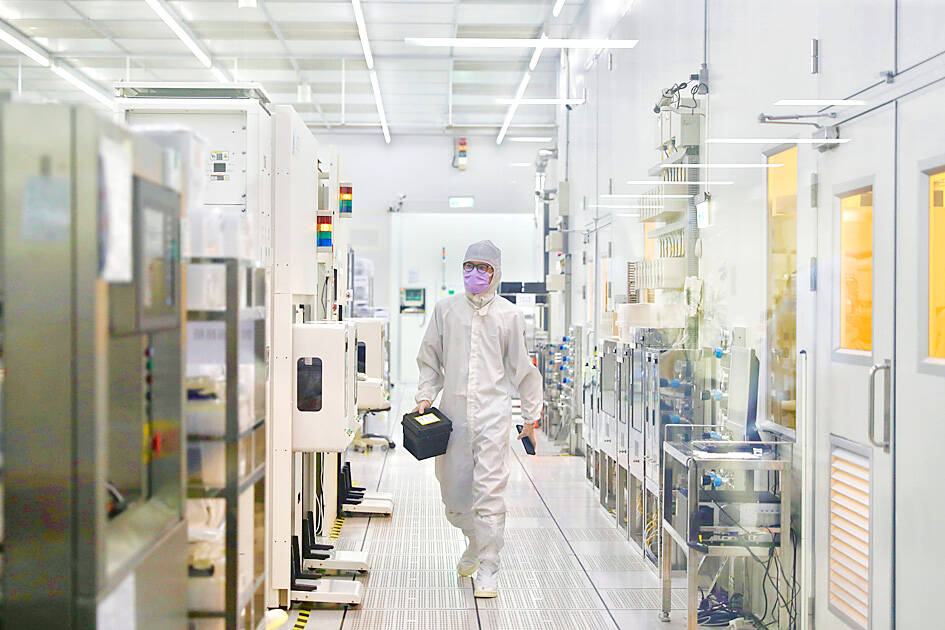Taiwan’s listed manufacturing companies accelerated their research and development (R&D) spending last year to a record high NT$692.7 billion (US$21.4 billion), despite declines in sales and profits, the Ministry of Economic Affairs said yesterday.
The spending was up 2.9 percent from NT$673 billion a year earlier, driven mainly by expenditures by those in the electronic parts, computer products and optical components industries, the ministry said in a statement.
Companies in the electronic components sector spent NT$450.7 billion on R&D last year, up 2.2 percent year-on-year and accounting for 65.1 percent of overall spending, while those in the computer products and optical components sector spent NT$158 billion, up 4 percent from the previous year and contributing 22.8 percent to the total, the ministry said.

Photo: Ritchie B. Tongo, EPA-EFE
In terms of individual companies, global foundry giant Taiwan Semiconductor Manufacturing Co (TSMC, 台積電) topped its local peers with R&D spending of NT$178.7 billion, up 11.1 percent from the previous year and accounting for 25.8 percent of total spending, the ministry said.
Smartphone chip designer MediaTek Inc (聯發科) came in second with spending of NT$80.6 billion and networking chip designer Realtek Semiconductor Corp (瑞昱) was in third place at NT$20.1 billion, it said.
The data compiled by the ministry showed that the 1,101 manufacturing firms listed on the Taiwan Stock Exchange and the Taipei Exchange — excluding overseas Taiwanese businesses with a primary listing in Taiwan — were still developing technologies to maintain their leading edge in the market, even though sales and profits decreased from the previous year.
The firms last year reported combined net sales of NT$18.88 trillion, down 10.7 percent year-on-year, while their overall operating profits decreased 26.4 percent to NT$1.49 trillion, with operating margin dropping 1.7 percentage points to 7.9 percent, the ministry said.
The setback was mainly due to headwinds facing the electronic components, the computer products and optical components, the chemical materials and fertilizer, and the petroleum and coal products sectors, it said.
Among the firms, Hon Hai Precision Industry Co (鴻海) garnered the highest sales of NT$3.45 trillion last year, followed by TSMC’s NT$2.15 trillion and Pegatron Corp’s (和碩) NT$1.18 trillion.
TSMC posted the highest operating profit of NT$907.4 billion, ahead of United Microelectronics Corp’s (聯電) NT$48.7 billion and MediaTek’s NT$42.3 billion.
With slowing growth momentum, investments in fixed assets by the listed manufacturing firms fell 20.9 percent year-on-year to NT$1.2 trillion last year, as a significant decline in investment by the electronic components industry offset higher outlays by the chemical materials and fertilizer, and the petroleum and coal products sectors, the ministry said.

EXPRESSING GRATITUDE: Without its Taiwanese partners which are ‘working around the clock,’ Nvidia could not meet AI demand, CEO Jensen Huang said Taiwan Semiconductor Manufacturing Co (TSMC, 台積電) and US-based artificial intelligence (AI) chip designer Nvidia Corp have partnered with each other on silicon photonics development, Nvidia founder and CEO Jensen Huang (黃仁勳) said. Speaking with reporters after he met with TSMC chairman C.C. Wei (魏哲家) in Taipei on Friday, Huang said his company was working with the world’s largest contract chipmaker on silicon photonics, but admitted it was unlikely for the cooperation to yield results any time soon, and both sides would need several years to achieve concrete outcomes. To have a stake in the silicon photonics supply chain, TSMC and

IDENTITY: Compared with other platforms, TikTok’s algorithm pushes a ‘disproportionately high ratio’ of pro-China content, a study has found Young Taiwanese are increasingly consuming Chinese content on TikTok, which is changing their views on identity and making them less resistant toward China, researchers and politicians were cited as saying by foreign media. Asked to suggest the best survival strategy for a small country facing a powerful neighbor, students at National Chia-Yi Girls’ Senior High School said “Taiwan must do everything to avoid provoking China into attacking it,” the Financial Times wrote on Friday. Young Taiwanese between the ages of 20 and 24 in the past were the group who most strongly espoused a Taiwanese identity, but that is no longer

A magnitude 6.4 earthquake and several aftershocks battered southern Taiwan early this morning, causing houses and roads to collapse and leaving dozens injured and 50 people isolated in their village. A total of 26 people were reported injured and sent to hospitals due to the earthquake as of late this morning, according to the latest Ministry of Health and Welfare figures. In Sising Village (西興) of Chiayi County's Dapu Township (大埔), the location of the quake's epicenter, severe damage was seen and roads entering the village were blocked, isolating about 50 villagers. Another eight people who were originally trapped inside buildings in Tainan

SHARED VALUES: The US, Taiwan and other allies hope to maintain the cross-strait ‘status quo’ to foster regional prosperity and growth, the former US vice president said Former US vice president Mike Pence yesterday vowed to continue to support US-Taiwan relations, and to defend the security and interests of both countries and the free world. At a meeting with President William Lai (賴清德) at the Presidential Office in Taipei, Pence said that the US and Taiwan enjoy strong and continued friendship based on the shared values of freedom, the rule of law and respect for human rights. Such foundations exceed limitations imposed by geography and culture, said Pence, who is visiting Taiwan for the first time. The US and Taiwan have shared interests, and Americans are increasingly concerned about China’s